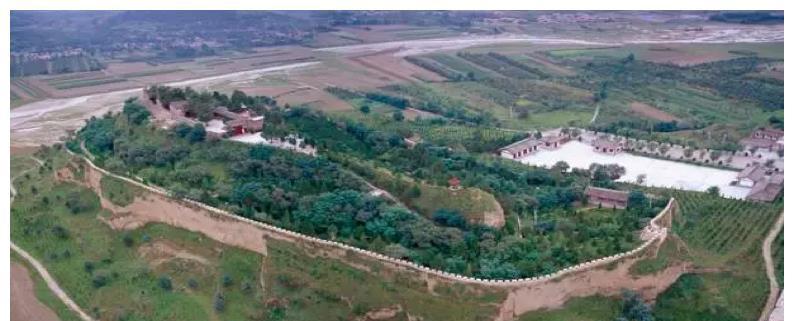When it comes to Zhuge Liang, people do not hesitate to associate him with divine calculations. In fact, however, some of his countermeasures in his later years have repeatedly failed miserably. For example, he went out of Qishan six times, five of which were northern expeditions, and none of them succeeded. The first four times were folded in lack of food, and the last time was planted in disease. People are very curious about this, where is Qishan? Why is its military significance so important?

Qishan mountain is located on the east side of Li County, Longnan City, Gansu Province, and north of the West Han River (a tributary of the Jialing River). It stretched from Beidi (present-day Pingquan Dabaozi Mountain) in the west to HaloCheng (present-day Yanguan Town) in the east, with a total length of about 50 miles. It strangles the throat of Shulong, connecting Shaanxi to the east and Sichuan to the south. "Six out of Qishan" is from the Romance of the Three Kingdoms, which is Luo Guanzhong's collective name for Zhuge Liang's Northern Expedition to the Cao Wei regime. In fact, Zhuge Liang only made five northern expeditions, two of which were on the Qishan Road, and the other three were to leave the pass and besiege ChenCang; to attack Wudu (into Chengxian County, Gansu) and Yinping (northwest of present-day Wen County, Gansu), leaving troops to defend; and taking the Chu Chuan Road, and finally wuzhangyuan. Zhuge Liang's five northern expeditions were all aimed at overthrowing Cao Wei and Restoring the Han Dynasty. In order to achieve this goal, he adopted the strategy of taking Chang'an first and then attacking Luoyang.
The author believes that the military significance of Qishan is important, but it is relative. For Cao Wei, this was not a key defensive place. But for Zhuge Liang, this is the only possibility of victory.
First of all, the Cao Army in Qishan had a relatively loose jurisdiction over it. Although this area belonged to the jurisdiction of Cao Wei, it was far from Luoyang and close to Qiang hu, so the defense system of the Cao army here was very weak. It can be said that the military strength here is the weakest place for Cao Wei. If the Shu army crossed it, it would mean that the initial goal of the Shu state to take Chang'an was expected to be achieved, and taking Chang'an meant that the Shu state's great cause of restoring the Han Dynasty was half realized.
Secondly, although from the overall point of view, the geographical location of Qishan is still "superior", Qishan is the farthest from Chang'an compared with meridian valley, Chen Cang, And Chu Xie. Therefore, in terms of the length of the road, Qishan is not the best offensive road.
However, compared with other mountain roads, the terrain is the lowest, the roads are the widest, and the defense is the weakest.
The Qishan Mountains are only four hundred meters high, and the road can easily pass a small row of people, but the meridian valley road near Chang'an is about a thousand meters above sea level, the road is so narrow that it can only be passed by a single person, and the remaining mountain roads are also towering into the clouds, but when encountering a storm, it is very likely that it will be blocked by a sudden mudslide.
For these considerations, the cautious Zhuge Liang rejected Wei Yan's "Meridian Valley DaoQi Scheme". In fact, he was well aware of the gap between the Shu army and the Cao army, and if the sneak attack on the Meridian Valley Road failed, it was bound to fight head-on with the Cao army, and the Shu army would undoubtedly lose. Therefore, he preferred Qishan Dao, when he pretended to attack Xiegu and lure the main force of Cao's army, while stealing out of Qishan and attempting to capture Chang'an in order to control Guanzhong, which can be described as a step-by-step battalion. At first, the Shu army rose steadily, but the Qishan Dao front was too long. In the later period, the generals and soldiers were exhausted, so they frequently lost and had to return to Hanzhong. After the defeat, he tried to take other mountain passes, but all of them were abandoned due to the terrain and the timely assistance of the main force of the Cao army. By the fourth time he went out of Qishan Province again, who expected that he had not yet engaged the Cao army, Liu Chan actually listened to rumors and ordered Zhuge Liang to retire, and at that time, the supply of grain and grass was insufficient, and Zhuge Liang could only return home. By the fifth time, he changed his course and died of illness. Throughout the first four Northern Expeditions, Qishan Dao had the most initiative and the greatest chance of victory, so its military significance to the Shu state was very important.
Now some people have questioned Zhuge Liang's strategy of leaving Qishan in the novel, but the author still holds a positive attitude towards it, after all, judging by the situation of Shu Han at that time, preemptive attack was the best choice. In addition, Zhuge Liang's spirit of facing difficulties again and again, bowing to the Death for the Kuang Fu Han Room, and then dying is indeed worthy of respect by the world.